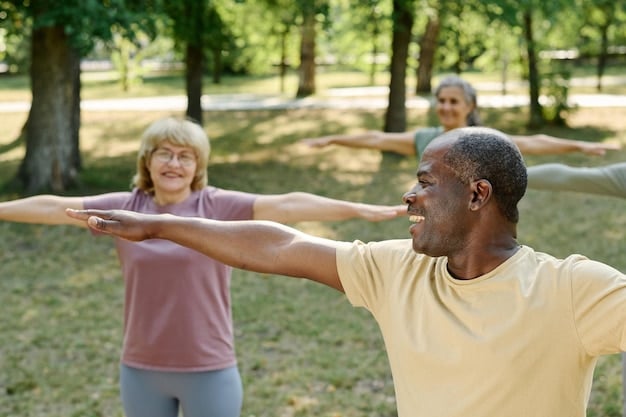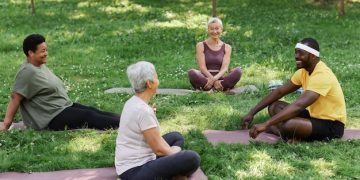Boost Your Mood: The Link Between Physical Activity and Mental Health

The link between physical activity and mental health is profound, with just 30 minutes of daily exercise significantly enhancing mood, reducing stress, and improving overall mental well-being by releasing endorphins and promoting better sleep.
Discover the link between physical activity and mental health. Integrating a simple 30-minute workout into your daily routine can unlock a wealth of benefits for your mind and body, paving the way for a happier, healthier you.
Unveiling the Power of Physical Activity on Mental Health
In today’s fast-paced world, mental health is just as crucial as physical health. Engaging in regular physical activity is a powerful tool to enhance your mood and improve your overall mental well-being. Let’s explore how exercise can become an integral part of maintaining a balanced and healthy life.
Physical activity isn’t just about shedding pounds or building muscle; it’s a holistic approach to wellness. When you move your body, you’re not only improving your physical health but also nurturing your mental resilience. Understanding this connection can motivate you to make exercise a regular part of your daily life.

How Exercise Directly Impacts Your Mental Well-being
Here are some of the direct impacts physical activity has on your mental state:
- Releases Endorphins: Often referred to as “feel-good” chemicals, endorphins act as natural mood elevators.
- Reduces Stress Hormones: Exercise helps lower levels of cortisol and adrenaline, which are associated with stress.
- Improves Sleep Quality: Regular physical activity can lead to more restful and restorative sleep, crucial for mental health.
These effects combined create a positive cycle. Consistent exercise helps you manage stress, sleep better, and feel more energized, all of which contribute to a greater sense of well-being.
In summary, the impact of exercise extends far beyond the physical realm. It’s a critical component in maintaining and improving mental health. This understanding emphasizes the importance of incorporating regular physical activity into our lives.
Aiming for 30 Minutes Daily: A Practical Approach
The recommendation to aim for 30 minutes of physical activity daily is not an arbitrary number; it’s a sweet spot that provides significant mental health benefits without being overwhelming. Let’s discuss why this duration is effective and how you can make it work for you.
Achieving 30 minutes of exercise daily can be more approachable than you think. It doesn’t require extreme workouts or extensive gym time. It’s about finding activities that you enjoy and that fit seamlessly into your daily routine.
Breaking Down Your 30-Minute Goal
Here are several ways to reach your daily goal:
- Short Bursts: Break your 30 minutes into smaller segments of 10 or 15 minutes.
- Consistency is Key: Try to be consistent with your daily exercise, even on weekends or days off.
- Make it Fun: Turn exercise into something you look forward to, not a chore.
By breaking down the goal into manageable chunks and focusing on enjoyable activities, you can make exercise a sustainable habit.
Overall, aiming for 30 minutes daily is a realistic and effective way to boost your mental health. By understanding the benefits and applying practical strategies, you can seamlessly integrate it into your lifestyle.
Choosing Activities You Enjoy: Making Exercise a Habit
One of the most significant factors determining whether you stick with an exercise routine is your enjoyment of the activities. When exercise feels like a chore, it’s much harder to maintain in the long term. Let’s look at how to choose activities that energize and uplift you.
Finding physical activities that you genuinely enjoy transforms exercise from a duty into a pleasure. This shift is essential for building a sustainable habit that benefits your mental health over the long haul.

Ideas for Enjoyable Activities
Options abound when it comes to choosing physical activities that you enjoy. Here are a few ideas to inspire you:
- Team Sports: Joining a local sports team can provide both physical activity and social interaction.
- Dancing: Whether it’s Zumba, salsa, or ballroom dancing, it’s a fun way to get your heart rate up and express yourself.
- Outdoor Adventures: Hiking, biking, and kayaking offer opportunities to explore nature while burning calories.
- Yoga or Pilates: These activities combine physical movement with mindfulness, promoting relaxation and stress reduction.
The key is to explore different options and find what resonates with you. Don’t be afraid to try new things until you discover activities that bring you joy.
In conclusion, selecting activities you enjoy is paramount for making exercise a lasting habit. By choosing options that energize and uplift you, you will reap the full mental health benefits of regular physical activity. This approach transforms exercise from a task into a source of pleasure and well-being.
The Ripple Effect: A Holistic Approach to Mental Well-being
Physical activity doesn’t occur in isolation; it sets off a ripple effect that improves various aspects of your life, all contributing to enhanced mental well-being. Let’s explore the other areas of your life that benefit from regular exercise.
When you commit to regular physical activity, you’re not just improving your physical and mental health. You’re also setting the stage for a more balanced and fulfilling life. This holistic approach maximizes the benefits of exercise.
Benefits of physical activity
How physical excercise can improve your life:
- Better Sleep: Regular exercise promotes better sleep, crucial for mental health.
- Social Connections: Group activities and team sports creates a sense of community improving feelings of loneliness.
- Productivity: Incorporating physical acitivity in your routine results in better focus and boosted productivity
All of these things will bring you the benefits of regular exercise. Try to think about how to incorporate physical activity into your day by day.
In short, physical activity isn’t an isolated endeavor; it’s a cornerstone of a holistic approach to well-being. By understanding and leveraging its ripple effect, you can transform multiple aspects of your life for the better, enhancing your overall mental health and happiness.
Making Time: Overcoming Barriers to Daily Activity
One of the most common challenges to incorporating physical activity into daily life is finding the time. Many people feel their schedules are too packed to fit in even 30 minutes of exercise. Let’s discuss how to overcome these barriers and make time for your mental and physical health.
Overcoming barriers to exercise is about identifying potential obstacles and creating strategies to work around them. By proactively addressing these challenges, you can carve out time for physical activity, no matter how busy you are.
Practical Tips for Making Time
Consider these practical strategies:
- Schedule it: Treat exercise like any other important appointment.
- Combine Activities: Combine socializing with exercising by meeting friends for a walk.
- Find Hidden Opportunities: Take the stairs instead of the elevator.
The key is to be creative and flexible. Find ways to weave physical activity into your existing routine, making it a natural part of your day.
In summary, making time for daily activity requires identifying and overcoming barriers. By adopting strategic approaches, you can successfully integrate exercise into your routine, ensuring you prioritize both your physical and mental well-being.
Tracking Your Progress: Staying Motivated and Engaged
Tracking your progress is a powerful tool for staying motivated and engaged with your physical activity routine. Seeing tangible results can provide a sense of accomplishment and encourage you to keep going. Let’s explore various methods for tracking your activity and measuring your mental health benefits.
Tracking progress can transform exercise from a chore into a rewarding experience. By monitoring your activities and mental well-being, you gain insights into your body and mind, fostering a deeper connection to your health.
Methods for Tracking Your Progress
Here are several effective methods for tracking your physical activity and mental health:
- Fitness Trackers: Wearable devices tracks steps, distance, and calories.
- Mental health Apps: Use apps to log your moods daily.
Remember to celebrate your achievements, no matter how small. Each step forward is a victory worth acknowledging.
Overall, tracking your progress is an indispensable tool for maintaining motivation and engagement with physical activity. By using various methods and regularly assessing your mental well-being, you can create a positive feedback loop that reinforces your healthy habits.
| Key Highlight | Brief Description |
|---|---|
| 💪 Endorphin Boost | Physical activity releases endorphins, natural mood elevators, enhancing your mental well-being. |
| ⏱️ 30-Minute Goal | Aim for 30 minutes of physical activity daily, breaking it into smaller segments if needed. |
| 🧘 Stress Reduction | Exercise lowers stress hormones like cortisol and adrenaline, improving mental health. |
| 😴 Improved Sleep | Regular physical activity promotes more restful and restorative sleep, crucial for mental well-being. |
Frequently Asked Questions
▼
Activities that you enjoy and are sustainable are the most beneficial. These could include walking, running, yoga, dancing, swimming, or playing sports. The key is to find something you look forward to doing.
▼
Many people experience immediate mood boosts after exercising. Consistent benefits, such as reduced stress and improved sleep, usually become noticeable within a few weeks of regular activity.
▼
Exercise can be a valuable addition to mental health treatment, but it should not replace medication or therapy prescribed by a healthcare professional. It’s best to discuss your treatment options with your doctor.
▼
Absolutely! There are many adaptive and low-impact exercises that can accommodate physical limitations. Consult with a physical therapist or adaptive exercise specialist to find activities that are safe and effective for you.
▼
Set realistic goals, find a workout buddy, reward yourself for milestones, and remind yourself of the benefits. Also, remember that even a short burst of activity is beneficial, so don’t feel like you have to do a full workout every time.
Conclusion
In conclusion, the link between physical activity and mental health is undeniable. Embracing just 30 minutes of daily exercise can significantly improve your mood, reduce stress, and enhance your overall well-being. By making physical activity a consistent part of your life, you’re not only investing in your physical health but also nurturing a happier, healthier mind.





